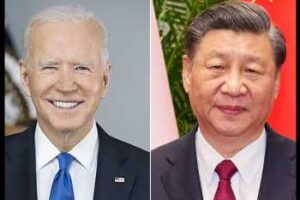Biden-Xi Jinping Summit Signals Improvement In US-China Ties

A summit between the Presidents of the United States and China has paved the way to improve relationship between the two major economic powers in a number of areas.
During their four hours-long meeting in Woodside, California, US President Joe Biden and his Chinese counterpart Xi Jinping agreed on taking joint actions to curb fentanyl production and restore military communication lines between the two countries.
“The two leaders held a candid and constructive discussion on a range of bilateral and global issues including areas of potential cooperation and exchanged views on areas of difference,” the White House said in a communique issued after the summit.
President Biden emphasized that the United States and China are in competition, noting that the United States would continue to invest in the sources of American strength at home and align with allies and partners around the world. He reiterated that the world expects the United States and China to manage competition responsibly to prevent it from veering into conflict, confrontation, or a new Cold War.
The two leaders made progress on a number of key issues. They agreed to resume bilateral cooperation to combat global illicit drug manufacturing and trafficking, including synthetic drugs like fentanyl, and establishment of a working group for ongoing communication and law enforcement coordination on counternarcotics issues. President Biden stressed that this new step will advance the U.S. whole-of-government effort to counter the evolving threat of illicit synthetic drugs and to reduce the diversion of precursor chemicals and pill presses to drug cartels.
More people in the United States between the ages of 18 to 49 die from fentanyl than from guns, car accidents, or any other cause, Biden noted in a news conference following the meeting.
The two sides agreed to resume high-level military-to-military communication, as well as the U.S.-China Defense Policy Coordination Talks and the U.S.-China Military Maritime Consultative Agreement meetings. Both sides are also resuming telephone conversations between theater commanders.
The leaders affirmed the need to address the risks of advanced AI systems and improve AI safety through U.S.-China government talks.
The two leaders exchanged views on key regional and global challenges. Biden reaffirmed the United States’ commitment to defend its Indo-Pacific allies. He emphasized the United States’ enduring commitment to freedom of navigation and overflight, adherence to international law, maintaining peace and stability in the South China Sea and East China Sea, and the complete denuclearization of the Korean Peninsula.
He raised concerns regarding human rights abuses in Xinjiang, Tibet, and Hong Kong.
He called for restraint in China’s use of military activity in and around the Taiwan Strait. President Biden also raised concerns about the Chinese government’s unfair trade policies, non-market economic practices, and punitive actions against U.S. firms. The President emphasized that the United States will continue to take necessary actions to prevent advanced U.S. technologies from being used to undermine its national security, without unduly limiting trade and investment.
The President raised the cases of American citizens who are wrongfully detained or subject to exit bans in China.
The two leaders committed to work towards a significant further increase in scheduled passenger flights early next year, in parallel with actions to restore full implementation of the U.S.-China air transportation agreement, to support exchanges between the two countries. The two leaders also encouraged the expansion of educational, student, youth, cultural, sports, and business exchanges.
Biden and Xi Jinping agreed that their teams will follow-up on their discussions in San Francisco with continued high-level diplomacy and interactions, including visits in both directions and ongoing working-level consultations in key areas, including on commercial, economic, financial, Asia-Pacific, arms control and nonproliferation, maritime, export control enforcement, policy-planning, agriculture, and disability issues.
Concluding his remarks, Biden said that in the months ahead, “we’re going to continue to preserve and pursue high-level diplomacy with the PRC in both directions to keep the lines of communication open, including between President Xi and me”. “He and I agreed that either one of us could pick up the phone, call directly, and we’d be heard immediately.”
Source: Read Full Article
